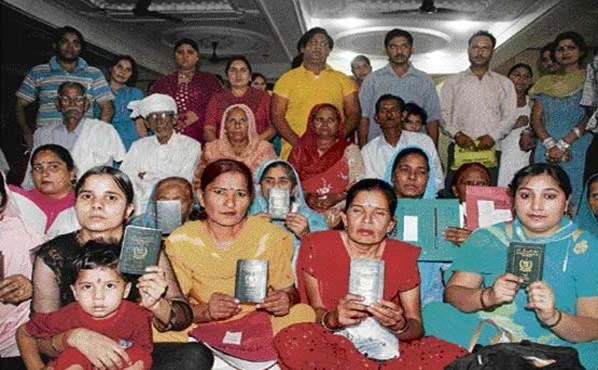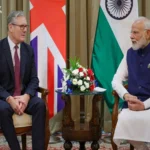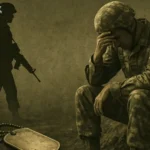Since its founding as a democratic and secular nation, India has presented itself to the world as a safe haven and home to the persecuted minorities especially the non-Muslim populations of its immediate neighbours like Pakistan, Bangladesh, and Afghanistan. Largely promoted in international towns and local arenas, this epic tale offers comfort, nationality, and honour to the religious minorities escaping persecution, mainly Hindus and Sikhs in the Muslim-majority countries. Yet, the gruesome and shadowy fate of Pakistani Hindu migrants who crossed the border into India in search of hope, protection, and a new life presents a much darker and more horrible image.
These are the migrants who had to leave their ancestral home, property, and the whole way of life in Pakistan with the hope and belief in the promises of the Indian state about safety and assimilation, and now they are in a kind of limbo where the citizenship remains a dream, everyday life a struggle to make ends meet, and the governmental affection has turned into the silent disappointment.
The promises given by India are just on paper and speeches, thousands of Pakistani Hindus are residing in the narrow lanes of their unofficial colonies and makeshift camps without electricity, clean water, medical facility and education to their children. The much-taunted Citizenship Amendment Act (CAA) of 2019, which was billed as a historic move to correct past injustices by giving Indian citizenship to non-Muslim refugees, mainly Hindus, living in South Asia, has miserably failed to translate these promises into reality.
The truth is that most of these hapless migrants have been left out of the provisions of the CAA, as they continue to languish in statelessness and undocumented status, years after the law was passed, languishing in poverty and limbo in camps largely scattered in Rajasthan, Gujarat, and the outskirts of Delhi. This is a betrayal of trust and is as cruel as it gets, this has driven these people to become nothing more than a political pawn. The irony is obvious- India, the country that claims its right to be a natural land of South Asian Hindu, has marginalized Pakistani Hindu migrants. They are no longer Pakistani or Indian; they occupy an administrative and legal vacuum, neither one thing nor the other.
Their deaths do not come as singular cases, but they represent the helplessness of a whole community who trusted India in its promise of security but instead found out fear, danger, and indifference. These killings completely opposite the pretence by India that it is a defender of minorities and casts doubt on whether the state is really concerned about these migrants outside of its political requirements. More alarming was the unsolved mysterious deaths of 11 Pakistani Hindu migrants in Jodhpur in August 2020, which made news briefly and then vanished into the ether, leaving no justice in sight, unresolved. To the families of these victims, and to their community at large, this is a tragedy that symbolizes the greatest disappointment they ever had in India.
Deplorable life of these migrants further highlights failed promises of India. More than 80,000 Pakistani Hindus have been shifted to illegal refugee colonies with no basic amenities. Modern day ghettos, these camps are primarily locating in Rajasthan and parts of Delhi, human rights are luxuries here. The absence of electricity would imply living in darkness once the sun goes down; the absence of water would imply relying on polluted sources of water that lead to illness; the absence of healthcare would imply pain and occasional death due to illness that could have been easily treated; the absence of education would imply that children, who are the future of this migrant community, will grow up illiterate and will have no place in the economic mainstream of India.
In the absence of any legal document such as Aadhaar cards or ration cards, these families cannot avail themselves of government welfare programs, food subsidies, health facilities and even jobs. There children are not allowed to attend schools since admission needs formal documents that they, do not have. In this way, a whole generation of Pakistani Hindu migrants is being doomed to ignorance, poverty and hopelessness. This is not simple negligence, this is a systematic exclusion, which is being continuously preserved by a bureaucracy that finds ways to postpone indefinitely their citizenship claims, meanwhile posing as defenders of refugee rights in the international arena.
The Citizenship Amendment Act promises have proved to be false and selective. The law was set in a manner to provide non-Muslim minorities of Pakistan, Bangladesh, and Afghanistan a new life in India, however, the reality of the practice has been outrageous. According to government statistics, of such migrants only 4,300 were granted citizenship in 201415, with 36,000 receiving long-term visas. Even these few benefits are unattainable to most of these 80,000 Pakistani Hindus. Their requests have been caught in the circle of paperwork, official delays and callous unconcern.
It is not surprising that the feeling of disillusionment has swept through such communities like a bush fire. About 800 families have found it painful to go back to Pakistan by 2021, and they concluded that the life they thought they would find in India was not promising, after all, it was a humiliating and degrading life of hunger, rejection, and despair. Their homecoming is an international disgrace to the reputation of India as a humanitarian power, and a dark testimony to the inability of the Indian state to fulfil its moral and constitutional duties.
But unfortunately, these migrants are not merely forgotten, they are also exploited as political tools especially when there is an upcoming election. They are thus trotted out during campaigns as living evidence of the generosity of the government towards Hindus of enemy nations. Politicians are promising them homes, jobs, and citizenship in fast-track in case they are elected into power. However, after the elections are over and the television cameras have disappeared, these pledges are set aside and the migrants are snared back into the shadows of their camps.
Each election period, this political exploitation has been recurrent whether at the municipal or national elections but the lives of the migrants have not changed. It has broken so many promises that most of them have lost all hope and accepted to live in statelessness and poverty forever. It is one thing to fail administratively, it is an entirely different level of moral and political deceit of the highest magnitude where human lives have become, and are used as, vote-gathering mechanisms only to be disposable after their use.
What is even more poignant in this betrayal is that it also rents asunder the self-image that India has been projecting of herself as a pluralistic, rights-respecting democracy. The international comity must understand that the Indian minority mistreatment is not just limited to its Muslim population or the domestic affair of communal stresses. This experience of Pakistani Hindu migrants demonstrates that even the people who profess the same religion as the majority in India are treated in the same way and exposed to the same level of negligence and injustice as long as they are outside and cannot be used by the political machinery of the state.
These Hindu migrants believed that they would be greeted as brothers and sisters, part of the larger Indian Hindu family, only to realize that they have become as marginalized and exploited as any minority group. This is state hypocrisy in full exposure: a nation which boasts of saving Hindus in the rest of South Asia, fails to offer dignity and safety even to those Hindus who have already reached its frontiers, fleeing protection.
The civil society and media in India have paid little attention to their plight, either not covering the issue at all, or reporting it as a problem resolved following the adoption of the CAA. The truth is that, on the ground, the law is yet to be implemented in the majority of the cases and the suffering did not cease. The domestic and international human rights groups have occasionally cried foul but their calls are overshadowed by the political clamour that maintains that India is doing its part as far as refugees are concerned. In the meantime, illness, poverty, and hopelessness increase their hold on the settlements of the migrants. Women and girls are particularly vulnerable, with no sense of security, sanitation, or healthcare they are exposed to gender-based violence and exploitation.
Lack of citizenship documents also implies that the migrants are unable to get formal jobs; most of them end up in bonded labour or begging on the streets or engaging in hazardous informal jobs to earn a living. The toll on their physical and mental health is already astronomical, there is some reporting increase in depression rates, suicidal attempts, and chronic diseases among the camp inhabitants. Each day of this limbo makes the wound of the broken promises even deeper and reveals the moral bankruptcy of the state that used to open its arms to these people.
The plight of the Pakistani Hindu migrants in India is a tragedy that requires immediate response by the government of India and the international community. Paying lip service to the enactment of a law such as the CAA, making election time statements of sympathy is no longer sufficient. To make a difference, promises must be fulfilled: offering citizenship, giving infrastructure, and reintegrating these people into society, and reinstating their dignity. Otherwise, the whole exercise of CAA will turn out to be a brutal farce and the reputation that India has earned as a refuge of minorities will shatter under the burden of its own lies.
Otherwise, the story of these migrants will go down in the history of modern India as one of the dark episodes, a lesson of what happens when political convenience is put above human rights, and when the weakest members of the society are left to their own devices by the state that was supposed to protect them and grant them safe refuge. The ethical scar of this debacle will remain in the generations, unless there would be some strongly felt and humane intervention to stop this sufferance of these forgotten people, and ultimately accord them the citizenship, security and dignity they so richly require.







